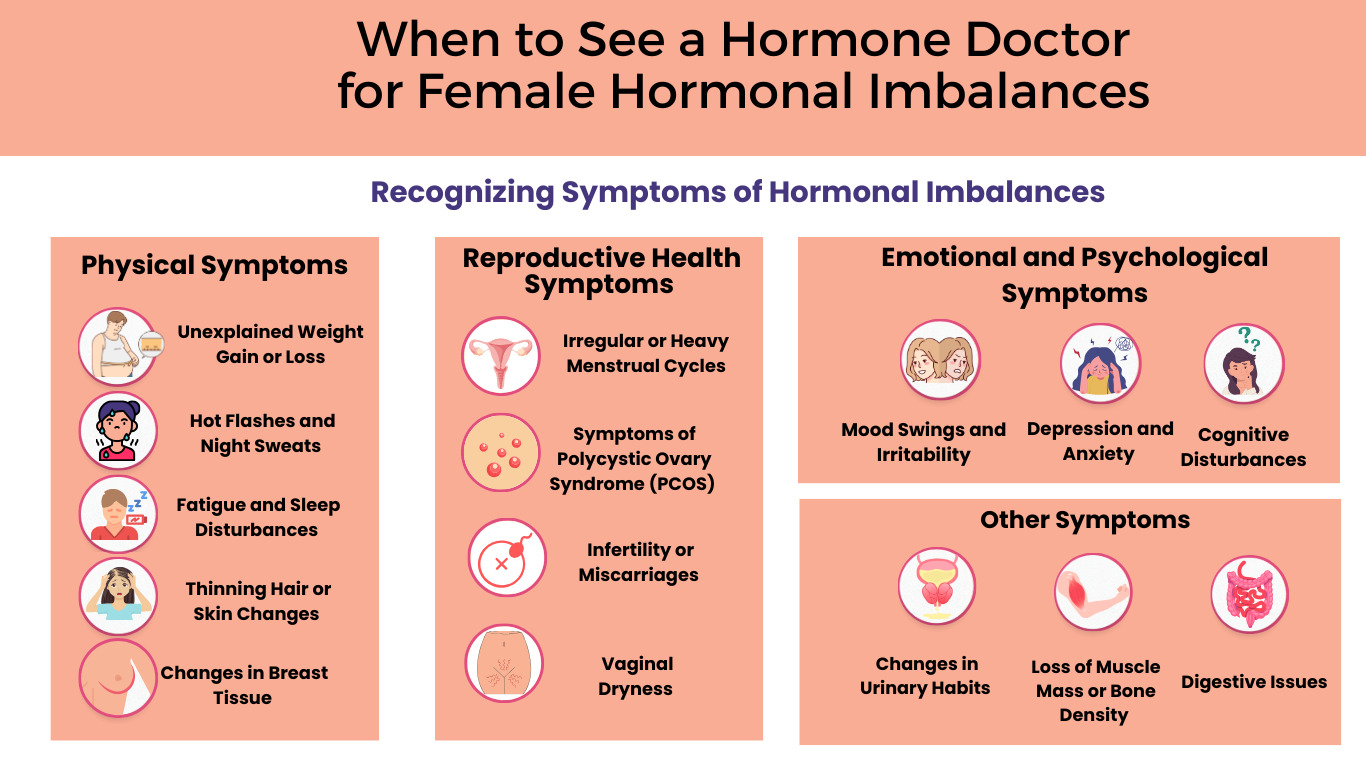
If you’ve been feeling confused by changes in your body, you’re not alone. Hormones can sometimes get off track and cause problems. In this guide, we’ll figure out when it’s time to see a women’s hormone doctor for issues with female hormones. Also, we’ll go through signs that might mean your hormones are out of balance, talk about when to see a doctor, explain what hormone doctors do, and introduce you to a treatment called Bioidentical Hormone Replacement Therapy (BHRT).
Let’s start and help you feel better!
Understanding Hormonal Imbalance
According to this study, hormones are messengers in your body that help with important things like growing up, having babies, sleeping, and handling stress. If these messengers aren’t working correctly, it can lead to problems. Nowadays, our busy lives and stress can sometimes make our hormones act up. Usually, our body keeps these hormone levels in check, but sometimes things can go wrong and we end up with too much or too little of certain hormones.
Recognizing Symptoms of Hormonal Imbalances
A hormonal imbalance can have a wide range of symptoms, depending on the specific hormones involved and the severity of the imbalance.
Let’s talk about how these hormone problems might show up in your body:
Physical Symptoms
1. Unexplained Weight Gain or Loss
Sometimes, changes in hormones can make you gain or lose weight. But other things like getting older and how you live your life can also affect your weight.
2. Hot Flashes and Night Sweats
Have you suddenly felt really hot, especially at night? This could be because your hormones are making your body’s temperature control go haywire.
3. Fatigue and Sleep Disturbances
Hormones can mess up your sleep, making it tough to fall asleep or causing you to wake up a lot during the night. Not getting enough sleep can mess up your hunger and even lead to issues like diabetes.
4. Thinning Hair or Skin Changes
When hormones change, it can also affect your hair – making it thin or even fall out. Your skin might get dry too. This often happens during pregnancy, menopause, or if your thyroid (a part of your body) isn’t working as it should.
5. Changes in Breast Tissue
Hormone changes can make your breasts feel different – they might get smaller or bigger, or you might feel lumps. It’s good to let your doctor know about any changes.
Emotional and Psychological Symptoms
1. Mood Swings and Irritability
Hormones can affect how you feel in your brain. When they’re off, you might get in bad moods or get annoyed easily. This can happen before your period or during menopause.
2. Depression and Anxiety
Researchers think that canges in hormones can also make you feel down or worried. Hormones mess with the chemicals in your brain that control your mood.
3. Cognitive Disturbances, Such as Memory Lapses
Sometimes, hormones can make it tough to think clearly. You might forget stuff or feel like your mind is cloudy. This can happen during menopause or if your thyroid isn’t working as it should.
Reproductive Health Symptoms
1. Irregular or Heavy Menstrual Cycles
If your periods aren’t regular (not at the same time each month) or you have pain, it could be because of hormone issues. There’s also something called fibroids that can cause problems like heavy bleeding or pain.
2. Symptoms of Polycystic Ovary Syndrome (PCOS)
This is when little lumps called cysts grow on your ovaries. It can mess with your periods and cause things like hair growth, changes in weight, and skin issues. Symptoms differ from woman to woman, and if left undiagnosed and untreated, PCOS can lead to heart ailments and diabetes.
3. Infertility or Miscarriages
According to a study, for women to have babies and keep pregnancies healthy, their ovaries need to work well and their bodies need to make certain hormones. There’s a common issue called polycystic ovary syndrome, where some hormone levels get messed up. This can cause problems with how hormones are released, which affects how the ovaries and other parts work.
Another thing that can cause problems is when the thyroid, a part in the neck that controls hormones, doesn’t work properly. If it’s not working well, it can make it harder to have a baby and increase the chance of losing a pregnancy.
So, in simple words, if the ovaries and hormones don’t work as they should, it can be tough to get pregnant and have a healthy baby.
4. Vaginal Dryness
Sometimes, it’s normal to have dryness in the vaginal area. But if you often feel this way, it might be because your body has lower levels of a hormone called estrogen. When these hormone levels aren’t balanced, it can make the area less moist and cause discomfort.
Other Symptoms
1. Changes in Urinary Habits
Sometimes, when hormones are not balanced, it can affect how often you need to go to the bathroom. You might feel like you have to pee more often or suddenly need to go.
2. Loss of Muscle Mass or Bone Density
Hormones help keep your muscles strong and your bones healthy. If they’re not balanced, your muscles might get weaker and your bones might not be as strong, which could affect how you move around and your overall health.
3. Digestive Issues
Ever felt uncomfortable in your stomach without knowing why? Hormones can also affect how your stomach and intestines work. This might lead to issues like feeling bloated, having gas, or not having regular bowel movements. It’s important to understand these links between hormones and digestion.
When to Seek Medical Advice
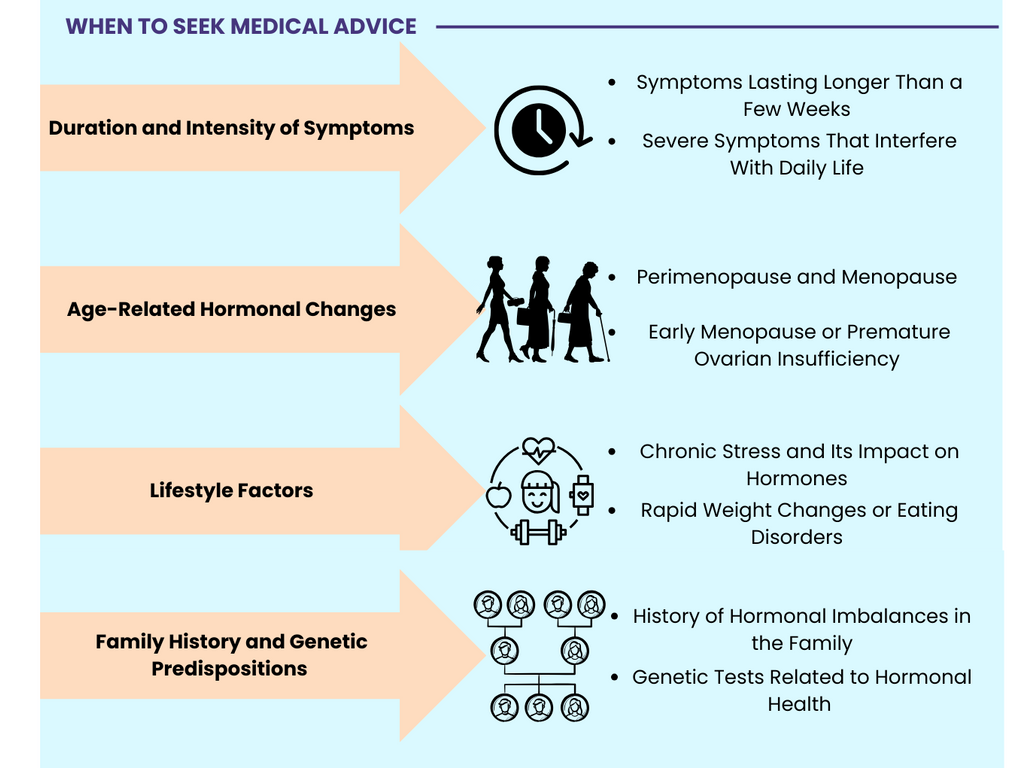
Duration and Intensity of Symptoms
1. Symptoms Lasting Longer Than a Few Weeks
Occasionally, it’s okay to have small changes in how you feel from time to time. But if these changes stick around for many weeks, it’s a good idea to talk to a professional to find out why.
2. Severe Symptoms That Interfere With Daily Life
If your symptoms are really strong and make it hard for you to do your normal activities, it’s important to get help. This can make your life better and help you feel well again.
Age-Related Hormonal Changes
1. Perimenopause and Menopause
As you get older, your hormones can change a lot, especially during perimenopause and menopause. Knowing about these stages can help you understand and manage their effects better. If the changes bother you, consulting a medical professional is a good step.
2. Early Menopause or Premature Ovarian Insufficiency
There are times when hormonal changes can happen earlier than usual. If you’re experiencing signs of menopause before you normally would, it’s important to seek specialized medical attention.
Lifestyle Factors
1. Chronic Stress and Its Impact on Hormones
Stress can mess up your hormones. To keep your hormones in good shape, it’s important to find ways to manage stress. Doing things like mindfulness and relaxation exercises can help a lot.
If you’re dealing with a lot of stress and it’s affecting how you feel, it’s a good idea to talk to a medical professional. They can help you find ways to manage stress and keep your hormones balanced.
2. Rapid Weight Changes or Eating Disorders
If you gain or lose weight really fast or have bad eating habits, it can mess up your hormones. Taking care of yourself by having a balanced lifestyle, eating well, and not making sudden changes to your weight can help keep your hormones and your overall health in check.
If you’re going through big changes in your weight or have unhealthy eating habits, it might be a good time to see a doctor for hormone imbalance. They can guide you on how to maintain a balanced lifestyle, which is important for your hormone health and overall well-being.
Family History and Genetic Predispositions
1. History of Hormonal Imbalances in the Family
If people in your family have had hormone problems, it might affect you too because of your genes. Knowing your family history can help you take care of your hormones early if needed.
2. Genetic Tests Related to Hormonal Health
There are tests that can tell you about your genes and how they might affect your hormones. Doing these tests can help you learn about your hormone health and make smart choices about your well-being.
The Role of a Female Hormone Specialist or Clinic
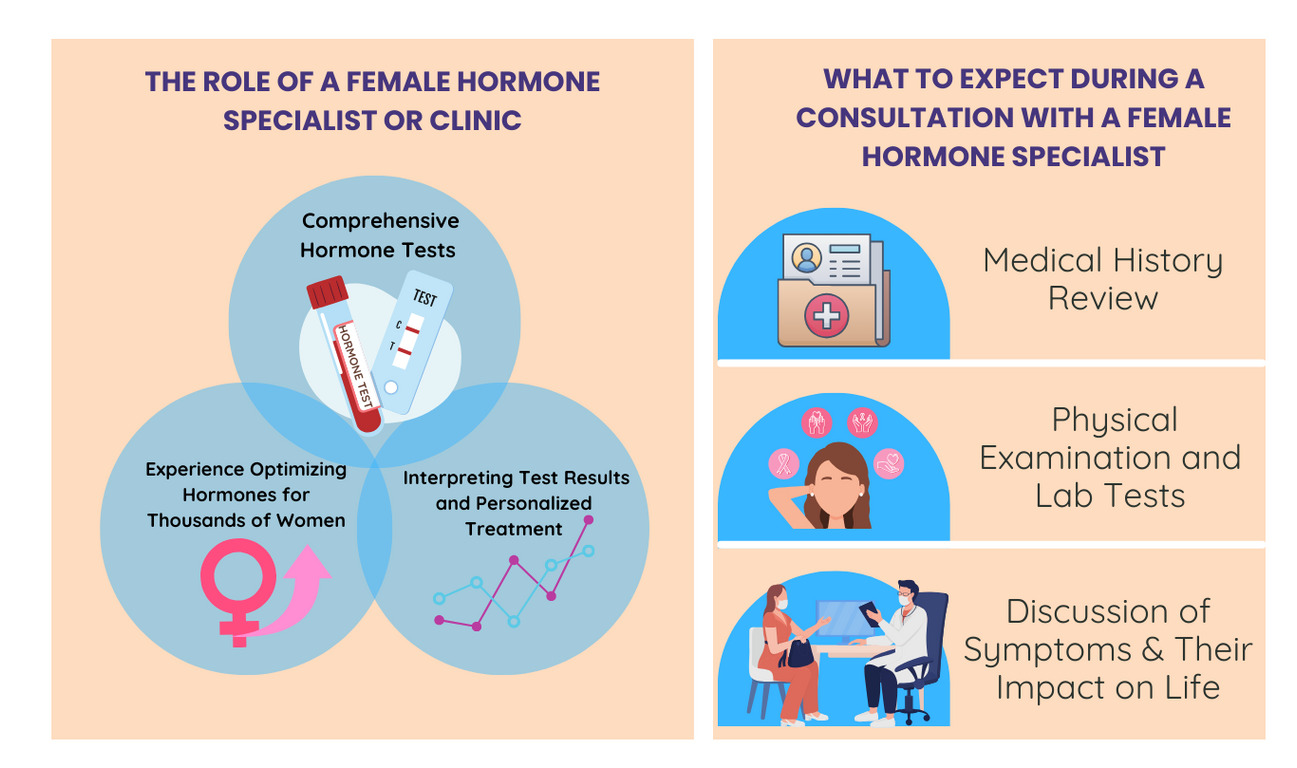
1. Comprehensive Hormone Tests
When you visit a female hormone specialist or clinic, they will use comprehensive hormone tests to learn about your body’s hormone levels. These tests are like special tools that allow them to see how much of each hormone is in your body. By knowing these levels, specialists can get a clear picture of how your hormones are balanced or imbalanced. It’s similar to getting a snapshot of what’s happening inside your body.
2. Interpreting Test Results and Personalized Treatment
- Interpreting Test Results: Female hormone specialists are like skilled translators for your body’s hormonal language. They take the results of your hormone tests and combine them with information about your medical history and any symptoms you’re experiencing. This helps them understand what your body is trying to tell them through your hormones.
- Personalized Treatment Plans: Once they’ve understood your body’s hormonal signals, specialists create a plan just for you. This plan is personalized to address your unique needs. It might include lifestyle changes, dietary recommendations, and sometimes medications or hormone therapies. It’s similar to getting a tailor-made roadmap to help your hormones get back on track and make you feel better.
3. Experience Optimizing Hormones for Thousands of Women
Female hormone specialists have worked with lots of women who have faced similar hormone-related challenges. They’ve seen a wide range of situations and have learned how different treatments can work for different people. This experience helps them guide you effectively because they’ve learned what tends to work and what doesn’t based on their interactions with many patients.
Through their experiences, female hormone specialists have gained expertise in finding solutions to hormone-related issues. They know how to balance hormones in a way that aligns with your body’s natural processes. Plus, they understand that dealing with hormonal imbalances can be tough, so they provide care and support with understanding and empathy.
So, visiting a female hormone specialist or clinic involves using specialized tests to understand your hormones, interpreting those results alongside your history and symptoms, and benefiting from their vast experience to create a personalized plan for a healthier hormonal balance.
What to Expect During a Consultation with a Female Hormone Specialist
1. Medical History Review
When you visit a female hormone specialist, they’ll start by asking you lots of questions about your health in the past. This helps them get a good picture of your health story and why you might be experiencing hormonal issues now. Think of it like putting together pieces of a puzzle to see the bigger picture.
2. Physical Examination and Lab Tests
The specialist will also give you a physical checkup. They might listen to your heart, check your blood pressure, and do other exams to understand how your body is doing. They might also ask you to do some lab tests, which are like special health tests that can show what’s happening inside your body. This helps them see the exact levels of hormones and other things in your blood.
3. Discussion of Symptoms and Their Impact on Life
- Talking About How You Feel: It’s important to tell the specialist about any symptoms you’re having. This could be things like feeling tired, changes in your mood, or physical issues. By sharing this, they get a better idea of what’s going on. Also, they’ll ask how these symptoms are affecting your daily life. For example, if you can’t sleep well, they’ll want to know how that’s impacting your energy and mood during the day.
- Creating a Plan Together: Talking about your symptoms helps the specialist come up with a plan that fits your whole well-being—both your body and your emotions. It’s like teaming up to figure out the best way to help you feel better.
So, during a consultation with a female hormone specialist, you’ll talk about your health history, get checked physically, and maybe do some tests. You’ll also share how you’re feeling and how it’s affecting you. All of this information helps the specialist create a plan to improve your hormonal health and overall well-being.
Bioidentical Hormone Therapy: The Solution to Imbalances
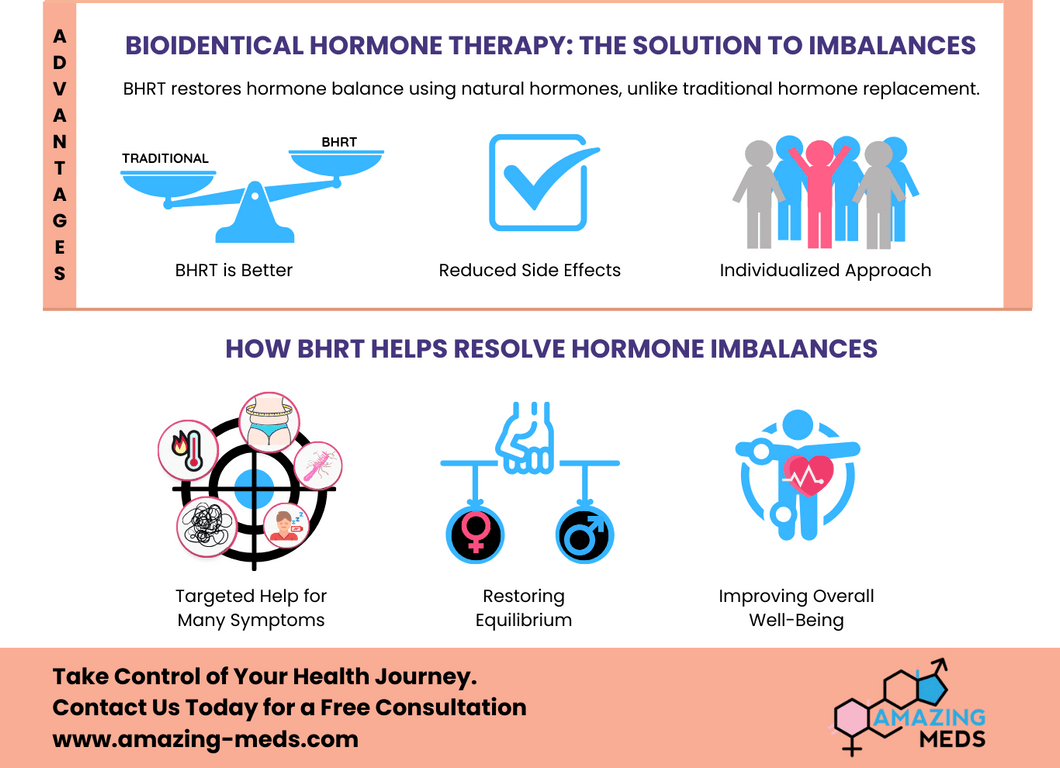
1. What is Bioidentical Hormone Replacement Therapy (BHRT)?
Bioidentical Hormone Replacement Therapy (BHRT) is a modern way to bring back balance to your hormones. It’s different from the usual hormone replacement because it uses hormones that are exactly like the ones your body makes naturally.
2. The Advantages of BHRT over Traditional HRT
- Why BHRT is Better: BHRT has a few important benefits over the older methods of hormone replacement. Since the hormones used in BHRT are very similar to what your body makes, it’s easier for your body to recognize and use them properly. This makes it less likely to cause side effects compared to traditional hormone replacement methods, which might use hormones that aren’t exactly the same as what your body produces.
- Reduced Side Effects: Because BHRT is tailored to match your body’s hormones, it’s considered a more natural approach. This often means fewer unwanted side effects, making the treatment smoother and more comfortable.
- Individualized Approach: BHRT is often personalized to your specific hormone levels and needs. This customization can lead to better results and a more comfortable experience.
3. How BHRT Helps Resolve Hormone Imbalances
- Targeted Help for Many Symptoms: BHRT is a precise solution for a wide range of issues linked to hormone imbalances. Hormones play a role in many bodily functions, so imbalances can lead to various symptoms like mood swings, hot flashes, and fatigue. By giving your body the right hormones through BHRT, the aim is to restore balance and alleviate these symptoms.
- Restoring Equilibrium: Hormones act like messengers in your body, and imbalances can disrupt the communication between different systems. BHRT helps re-establish this communication, allowing your body to function more harmoniously.
- Improving Overall Well-Being: When your hormones are balanced, you’re likely to feel better overall. BHRT doesn’t just target individual symptoms; it aims to improve your overall quality of life by bringing your hormones back into the right balance.
In summary, Bioidentical Hormone Replacement Therapy (BHRT) offers a modern way to address hormone imbalances. By using hormones that match your body’s own, it minimizes the risk of side effects and is tailored to your individual needs. BHRT focuses on restoring balance and can lead to an overall improvement in how you feel.
Amazing Meds: Nationwide Hormone Clinic Specialized in BHRT
At Amazing Meds, our goal is to provide you with education and support as you navigate the path to better hormone health. While there isn’t a single definitive test to determine hormone balance, we take a comprehensive approach by listening to your symptoms, asking targeted questions, and collaborating with you to find effective solutions.
Why Choose Us for Your Journey?
- Expertise that Matters: Our team of BHRT professionals possesses extensive expertise in the intricate realm of hormone health. We recognize the vital connections between hormones and factors like weight management. Count on us to offer well-informed guidance rooted in both knowledge and hands-on experience.
- Tailored Plans Just for You: We acknowledge the uniqueness of each individual. Our BHRT plans are meticulously designed to align with your specific hormone levels, body composition, and personal weight goals. Through this personalized strategy, we ensure that your journey is not only effective but also sustainable in the long term.
- Convenience through Telemedicine: Understanding the demands of modern life, we provide the convenience of online hormone replacement therapy via telemedicine. This means you can connect with our female hormone specialists from the comfort and privacy of your home. Our telemedicine service respects your busy schedule and aims to accommodate your needs.
- A Holistic Approach: While BHRT is a cornerstone of our approach, we emphasize a holistic perspective. Beyond hormonal optimization, we take into account elements like nutrition, exercise, and lifestyle choices. Our intention is to equip you with a comprehensive toolkit for achieving lasting success in your weight and health journey.
- Guidance and Support: Recognizing that your journey is unique, we’re committed to providing unwavering support at every step. Our team is not only available to address your questions but also to offer practical advice, motivational encouragement, and empathetic guidance. Your aspirations are our priority.
Ready to Begin? Contact Amazing Meds
Taking on a path toward improved well-being begins with a conversation. Contact us to take the initial step toward better health. We encourage you to openly share your symptoms with us, as it enables us to tailor our approach to best meet your needs. Your health and comfort are paramount, and we’re here to facilitate your journey to a revitalized sense of self.
Click here to contact Amazing Meds.
Frequently Asked Questions
At What Age Do Most Women Begin to Experience Hormonal Imbalances?
Hormone imbalances can begin as early as late teens or early twenties. They can happen when you’re older too, especially during perimenopause and menopause, which are times of big changes in hormones.
Is It Possible for Younger Women, Even in Their 20s, to Experience Hormonal Imbalances?
Yes, Possible: Younger women, even in their 20s, can have hormone imbalances. This can be due to different things like lifestyle, genes, or health conditions. These imbalances can happen at any age.
How Do Lifestyle Factors Like Diet, Exercise, and Stress Influence Hormone Levels?
What you eat, how you move, and how stressed you are affect hormones. Eating balanced meals, exercising regularly, and managing stress can help keep your hormones in balance and make you feel better.
How Does Menopause Impact Overall Hormone Levels and How Can BHRT Help?
Menopause is when some hormones drop a lot. BHRT can help with menopause symptoms by giving your body the hormones it needs, which can make you feel better.
How Long Does It Typically Take to See Results from BHRT?
People see changes at different times. Some might feel better in a few weeks. Remember, everyone is different, so it’s important to be patient and give it time.
Will My Insurance Cover the Costs of Hormone Balancing Using BHRT?
Whether your insurance covers hormone replacement therapy (HRT) depends on your insurance plan and your situation. It’s a good idea to ask your insurance company if they cover HRT. You can also contact Amazing Meds to see if we accept your insurance. You might find more information about insurance coverage for bioidentical hormones in the following guide: Are Bioidentical Hormones Covered by Insurance?
What Role Does Stress Play in Hormonal Health, and How Can I Manage It Effectively?
Stress can mess with your hormones and how your body works. To manage stress, try techniques like being mindful, doing meditation, and relaxing. This can help your hormones and your health.
Don’t Wait. Contact Our Hormone Clinic
Take control of your well-being by contacting our hormone clinic. Understand your body better, proactively address hormone imbalances, and receive personalized guidance from our experts to lead a healthier and more balanced life.
Contact us here: https://amazing-meds.com/contact-us/
Key Takeaways
Hormones play a vital role in major processes within your body, influencing everything from mood and energy levels to metabolism and reproduction. When these hormones are out of balance, it can lead to a wide range of symptoms and disruptions in your well-being.
Dealing with hormonal imbalances isn’t something to ignore. These imbalances can cause various complications that affect your quality of life. Seeking treatment as soon as you notice any unusual changes in your body or energy levels is crucial. Don’t hesitate to have a conversation with your doctor about hormone imbalance concerns. Early detection and intervention can make a significant difference in effectively managing and addressing hormonal imbalances. Your health and well-being are worth taking proactive steps for.
When to See a Doctor for Female Hormone Imbalance – A Visual Summary
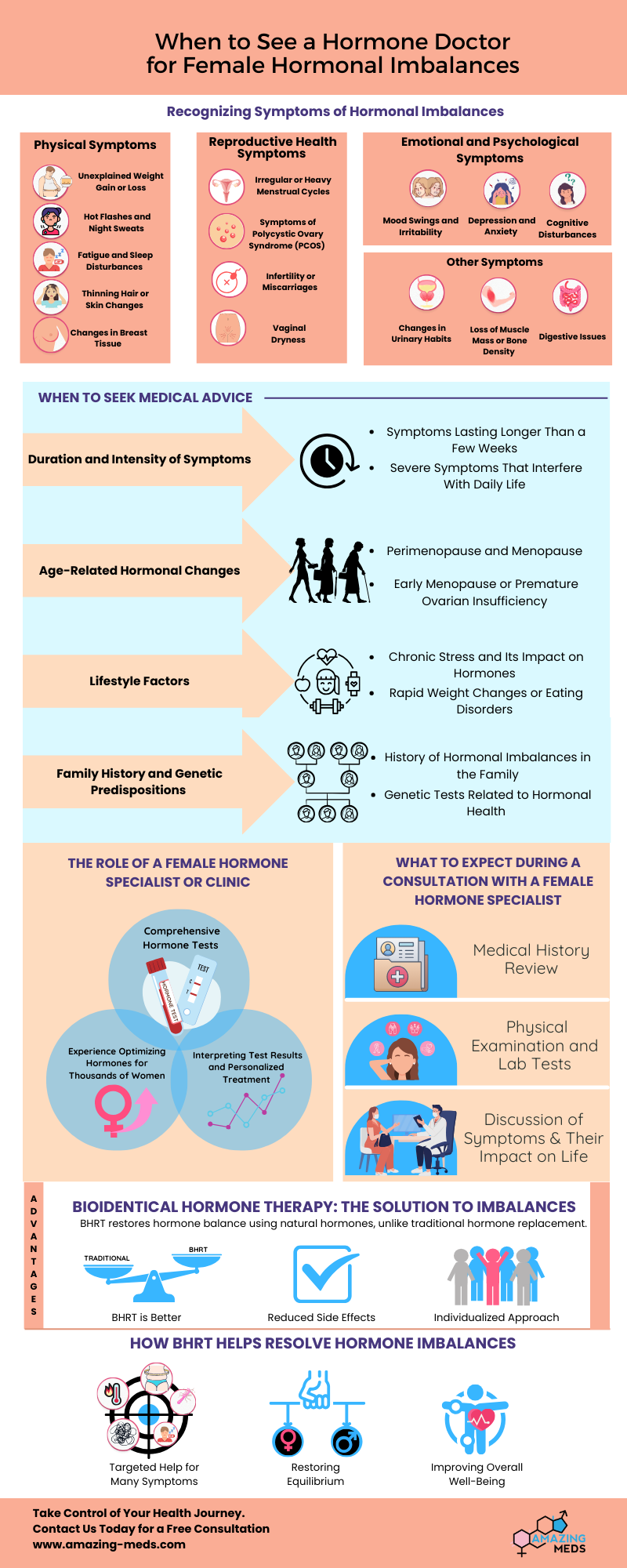
References
- Roop, J. K. (2018). HORMONE IMBALANCE—A CAUSE FOR CONCERN IN WOMEN. Roop RJLBPCS 2018, 4(2), 237. DOI: 10.26479/2018.0402.18.
- Kundakovic M, Rocks D. Sex hormone fluctuation and increased female risk for depression and anxiety disorders: From clinical evidence to molecular mechanisms. Front Neuroendocrinol. 2022 Jul;66:101010. doi: 10.1016/j.yfrne.2022.101010. Epub 2022 Jun 15. PMID: 35716803; PMCID: PMC9715398.
- Bendarska-Czerwińska A, Zmarzły N, Morawiec E, Panfil A, Bryś K, Czarniecka J, Ostenda A, Dziobek K, Sagan D, Boroń D, Michalski P, Pallazo-Michalska V, Grabarek BO. Endocrine disorders and fertility and pregnancy: An update. Front Endocrinol (Lausanne). 2023 Jan 17;13:970439. doi: 10.3389/fendo.2022.970439. PMID: 36733805; PMCID: PMC9887196.
